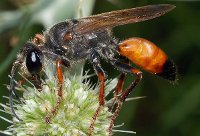Public sex can be extremely dangerous
 Australian zoologist Darrell Kemp had conducted an interesting study that confirmed the assumption that public sex can be dangerous to the lives of the lovers. Studying the process of Sphex wasps hunting the Australian locust, he discovered that those "in love" were attacked by predators more frequently. Females were much less lucky than males.
Australian zoologist Darrell Kemp had conducted an interesting study that confirmed the assumption that public sex can be dangerous to the lives of the lovers. Studying the process of Sphex wasps hunting the Australian locust, he discovered that those "in love" were attacked by predators more frequently. Females were much less lucky than males.

Needless to say, sex is a healthful and pleasant exercise. After all, most living creatures would not have offspring after the process. However, few are aware of the fact that sex can also be very dangerous. Many predators prefer to hunt for those who, forgetting everything in the world, are selflessly engaged in procreation.
Interestingly, many biologists agree with this statement, but until now nearly no one tried to calculate what percentage of those who have sex may be caught by predators. Recently, a zoologist at the University of Macquarie Darrell Kemp (Australia) decided to assess the risk of death during sex using numbers. The objects of his study were representatives of the Australian locust (Chortoicetes terminifera) and preying on them local wasp Sphex cognatus.
It should be noted that adult Sphex do not feed on locusts, as well as grasshoppers, mantises or stick insects. Like the Olympic gods, they are content with flower nectar. They attack these insects only to feed their babies. Having noticed the victim, Sphex jumps on it, paralyzes it, and drags it into a hole where it will serve as food for the wasp larvae.
These hunters are most active in the beginning of the Australian summer (December), when the locust usually begins to gather in flocks. It is in these flocks where mass mating occurs.
Having conducted a series of experiments, the biologist noted that, while mating locusts accounted for approximately three percent of the total number, they were attacked first. With each attack wasps in couples accounted for 30 percent of the victims. In contrast, single species rarely suffered from attacks of predators - Sphex attacked solitary females in one case out of two hundred. Males were generally not attacked.
Further, Mr. Kemp decided to find out which gender is more likely to suffer from the attacks by predators during copulation. According to his calculations, in nine out of ten cases Sphex preferred to paralyze females, and only one in ten males. The attacking wasps were all females (males of these insects, like most of their kin, die nearly immediately after mating). Rather, the predators are attracted by the larger size of female locusts.
At the same time, on several occasions the scientist has observed very curious circumstances occurring with males who were the most "passionate" lovers. During Sphex attacks they, indulging in amorous pleasures, noticed nothing around them, including the fact that a wasp was dragging their paralyzed partners to its burrow. Unable to tear themselves away from the female, the "macho" would also find themselves in a wasp's nest.
In conclusion of his study, Mr. Kemp suggests that, perhaps, in many animal species sex is associated with the increased risk of being eaten. It is hard to say whether this assumption is true because research on this subject is insufficient. However, there is an assumption that once upon a time such danger existed for humans, which made them have sex in secluded and well protected places.
It has long been known that virtually all apes, including chimpanzees, never feel embarrassed by the fact that their love games are watched by all their relatives. Moreover, in certain extent this is evolutionary justified, because every female watching the process can better assess the male "in action" and try to seduce him when he is available. Only among humans public sex has never been a common practice (with the exception of certain religious orgies).
Some anthropologists believe that the search of solitude for love in people was caused by the presence of large predators nearby. If chimpanzees living in the woods can quickly interrupt copulation and crawl up a tree, in the savannah where our ancestors lived it was hard to do. A large crowd of people could attract lions, hyenas, saber-toothed tigers or other predators.
As a result, our ancestors began to look for more secluded places in order to procreate. This gradually led to the abandonment not only of public sex, but even open display of genitals. As a result, sex in Homo sapiens became the only "personal matter", which is always done in a safe place - once again not to attract the attention of predators.
This model looks realistic enough. It is not ruled out that many animals also prefer not to have sex in the public eye because of fear of being eaten. After all, procreation sometimes can be really life-threatening.
Anton Evseev
Pravda.Ru
Subscribe to Pravda.Ru Telegram channel, Facebook, RSS!




